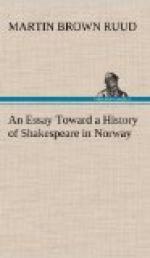The tercentenary of Shakespeare’s birth (1864) aroused a certain interest in Norway, and little notes and articles are not infrequent in the newspapers and periodicals about that time. Illustreret Nyhedsblad[4] has a short, popular article on Stratford-on-Avon. It contains the usual Shakespeare apocrypha—the Sir Thomas Lucy story, the story of the apple tree under which Shakespeare and his companions slept off the effects of too much Bedford ale—and all the rest of it. It makes no pretense of being anything but an interesting hodge-podge for popular consumption. The next year, 1864, the same periodical published[5] on the traditional day of Shakespeare’s birth a rather long and suggestive article on the English drama before Shakespeare. If this article had been original, it might have had a certain significance, but, unfortunately, it is taken from the German of Bodenstedt. The only significant thing about it is the line following the title: “Til Erindring paa Trehundredsaarsdagen efter Shakespeares Foedsel, d. 23 April, 1563.”
[4. Vol. XII (1863), pp. 199 ff.]
[5. Vol. XIII (1864), pp. 65 ff.]
More interesting than this, however, are the verses written by the then highly esteemed poet, Andreas Munch, and published in his own magazine, For Hjemmet,[6] in April, 1864. Munch rarely rises above mediocrity and his tribute to the bard of Avon is the very essence of it. He begins:
I disse Dage gaar et vaeldigt Navn
Fra Mund til Mund, fra Kyst til Kyst rundt
Jorden—
Det straaler festligt over fjernest Havn,
Og klinger selv igjennem Krigens Torden,
Det slutter alle Folk i Aandens Favn,
Og er et Eenheds Tegn i Striden vorden—
I Stjerneskrift det staaer paa Tidens
Bue,
Og leder Slaegterne med Hjertelue.
[6. Vol. V, p. 572.]
and, after four more stanzas, he concludes:
Hos os har ingen ydre Fest betegnet
Vort Folks Tribut til denne store Mand.
Er vi af Hav og Fjelde saa omhegnet,
At ei hans Straaler traenge til os kan?
Nei,—Nordisk var hans Aand
og netop egnet
Til at opfattes af vort Norden-Land,
Og mer maaske end selv vi tro og taenke,
Har Shakespeare brudt for os en fremmed
Laenke.
One has a feeling that Munch awoke one morning, discovered from his calendar that Shakespeare’s birthday was approaching, and ground out this poem to fill space in Hjemmet. But his intentions are good. No one can quarrel with the content. And when all is said, he probably expressed, with a fair degree of accuracy, the feeling of his time. It remains but to note a detail or two. First, that the poet, even in dealing with Shakespeare, found it necessary to draw upon the prevailing “Skandinavisme” and label Shakespeare “Nordisk”; second, the accidental truth of the closing couplet. If we could interpret this as referring to Wergeland, who did break the chains of foreign bondage, and gave Norway a place in the literature of the world, we should have the first reference to an interesting fact in Norwegian literary history. But doubtless we have no right to credit Munch with any such acumen. The couplet was put into the poem merely because it sounded well.




